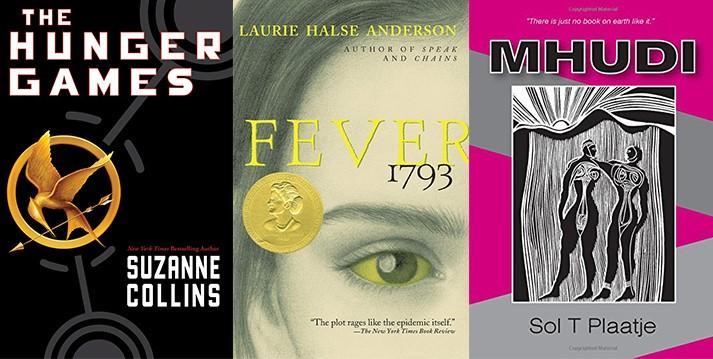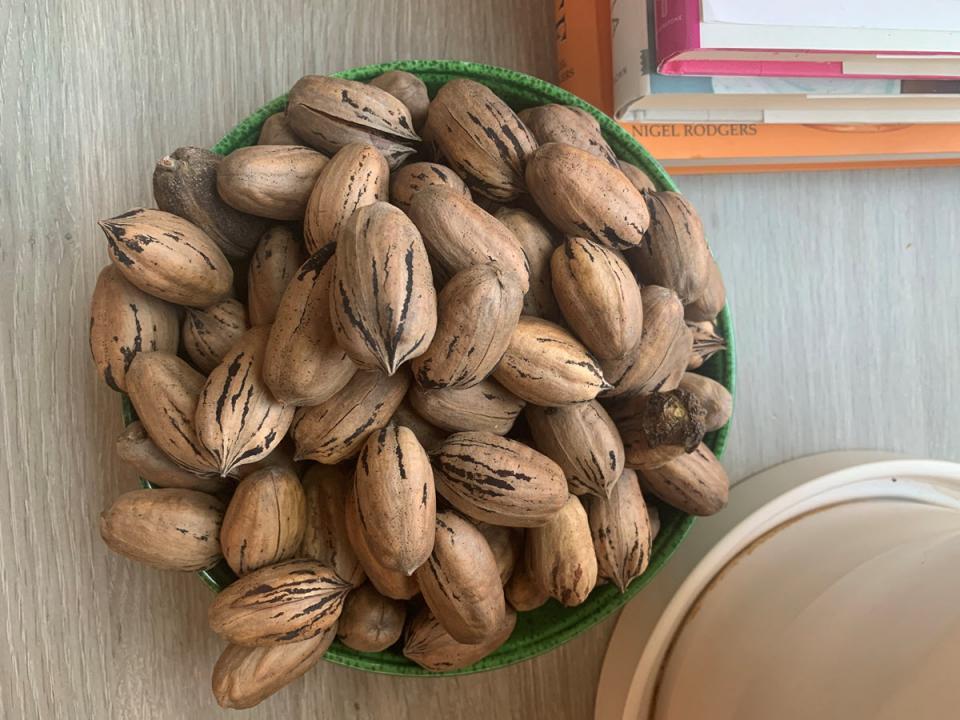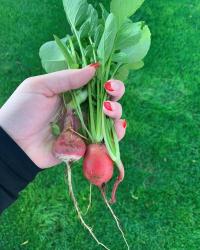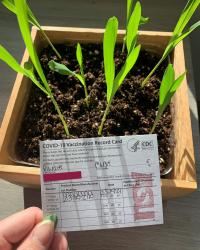Growing in the time of COVID-19
Living through a pandemic can make everything feel overwhelming. For me, sometimes it’s a challenge to muster the same vigor for life as I felt in “the before times.” I’ve found solace in small things: lately, rereading a beloved childhood book and tending what I’ve planted in my on-campus garden. While literary and horticultural pursuits are seemingly disconnected, I’ve learned that the links are there and that noticing them adds to my overall appreciation for both.
I have always loved to read. When I was younger, it wouldn’t have been surprising to find me with my nose in a book through lunch, in between classes, at the mall, or anywhere, really. English was an obvious choice for my major. I’ve enjoyed every minute of the classes, experiences and environments in which I’ve been immersed because of that choice.
Serendipitously, I was assigned a young adult favorite, The Hunger Games by Suzanne Collins, in two different English courses this year: Jewell Parker Rhodes’s “Children’s Literature: Adventure and Survival” (ENG 394) and Melissa Free’s “Female Action Hero” (ENG 461). Re-reading the book as an adult, and in a pandemic, allowed me some nostalgia for an academic purpose. It also gave me a different perspective on resilience. Plants enable the physical survival of Katniss in The Hunger Games, as she views them strictly as food. For me, they provide an emotional wellness boost as well. When I eat zucchini or radishes I have grown, I am nourishing both my body and my mind. It is incredibly fulfilling to tend to these little seeds, protecting them from weeds and drought as they burgeon and bloom, then to have my work come to fruition when I eat them. It’s pure joy.
As in The Hunger Games, the theme of Fever, 1793—which we also read in my children’s literature course—was survival. However, the book was even more applicable to the current moment as it takes place in Philadelphia during a pandemic. The protagonist, Mattie, forages for berries in one scene, needing to find sustenance for her grandpa and herself as they are stranded in the countryside. Although thankfully in much less dire circumstances, I spent time this past year rummaging around ASU’s campus to finding snacks! I foraged lemons, grapefruit, dates, and even pecans. There is something incredibly satisfying about cracking open a pecan after spending fifteen minutes trying to knock it from a tree. It might not sound peaceful, but gathering food and then sharing it is strangely rewarding.
While not directly related to my garden, my “Female Action Hero" class provided additional examples of perseverance that continue to inspire me. In addition to The Hunger Games, we read Mhudi, the story of a South African woman who faces a multitude of challenges, most notably, lions! The eponymous heroine comes out on top and more resilient each time. Having classes that put powerful women at the forefront of the curriculum was extremely empowering; it is important to see people rise after being knocked down. We all have our lions to fight, though mine are not literal.
Maybe because my academic pursuits are indoor and mostly solitary, I have gravitated toward hobbies that provided balance; I particularly find meaning in those that connect to nature or involve giving things to others. This year, I took a gardening course with Deborah Thirkhill, who is Arboretum Program Coordinator for ASU’s Grounds Services. I was inspired by my grandparents, who have an expansive garden, mostly featuring flowers. I’ve always wanted to have a garden like that.
Apparently I’m not the only one who went “back to basics” in my lockdown projects. Many people have jumped on the trend and have started their own gardens during the pandemic. Gardening has been shown to improve mental health. A study done this year found gardening is one of the activities linked with the highest levels of increases in positivity. People began gardens to avoid trips to the grocery store and to eat healthier without risking themselves to COVID. Many people said they had always longed to garden, but never had the time, so with nothing but time on their hands, they began! In the NBC News article, “Peas and Quiet? In Times of Turbulence, Americans Turn to Gardening,” the author interviewed first time gardeners such as Cristina Woo, who said, “My plants have all my time right now. My refuge is to go back to my yard.”
I find this to be true for me, as well. Tending to my garden serves as a mental wellness tool. To be able to stay focused, present, and do well in my classes I need that time and space. My current gardening project? Growing corn. I started by germinating seeds in a small box of dirt in my apartment. Once they grew large enough, I moved the seedlings to my garden plot. They won’t produce actual ears of corn for a little longer, but I love to see them sprout, regardless. It is incredibly healing to be immersed in nature, especially when I can witness the growth of my plants, from sprouts to fruit-bearing.
This activity isn’t too far removed from one of my earlier coping skills: bread-making. My first year at ASU, I made bread religiously, producing a loaf almost every day in my dorm. It was startling to be thrust into college and baking bread was grounding for me. It was also rewarding to give bread to my friends and fellow students. As for my garden, once my corn grows, I plan to grind the seeds to make cornmeal and, eventually—bread! I love to give the vegetables that grow quickly—like lettuce—to my friends and family. I perform my best when I have these hobbies that allow me to give back.
—Margot Plunkett
Image 1: Courtesy photo of Margot Plunkett
Image 2: Covers of The Hunger Games, Fever 1793, and Mhudi, books from which Plunkett drew inspiration over this pandemic year.
Image 3: Courtesy photo of pecans Plunkett foraged from ASU trees.
Image 4: Courtesy photo of radishes from Plunkett's garden.
Image 5: Courtesy photo of Plunkett's corn plant seedlings and a redacted image of her COVID-19 vaccination card.
Study cited: Lades, Leonhard K., Kate Laffan, Michael Daly, and Liam Delaney. “Daily emotional well‐being during the COVID‐19 pandemic.” British Journal of Health Psychology 25:4 (November 2020): 902-911.





